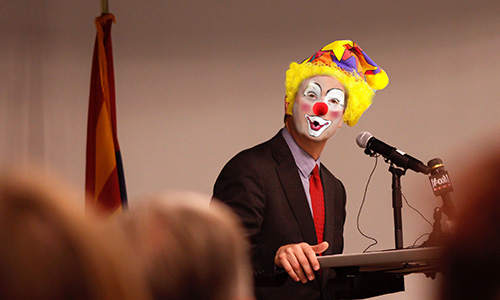
CORRECTION: An earlier version of this story erroneously reported that Mayor Greg Stanton was a ghost all along. It has been updated to reflect that he was in fact a clown all along.
An analysis of archival footage from Greg Stanton’s various public appearances and press events suggests that the mayor of Phoenix has been a clown all along.
A collaboration between the Phoenix Diablo, the Paranormal Center for Investigative Reporting, and University of Arizona College of Clowning- Phoenix looked at 107 minutes of footage to reach this conclusion.
“Everything looks pretty normal the first time you watch it,” said Joel Otmens, executive director of PCIR. “But if you watch it again knowing that Stanton’s a clown you’ll understand why young children are so frightened by him and why he takes his vacation whenever the circus is in town.”
Other key clues uncovered include credit card charges showing thousands of dollars spent at Sephora and MAC on theatre makeup and Stanton’s opponents’ urinating in their pants out of fear during debates in the 2011 and 2015 elections.
It’s currently unclear how Stanton’s status as a clown, the most ostracized of children’s entertainment, will impact his second term in office or urban development policies. The revelations have made some, like downtown advocate Steve Stevoski, doubtful of the mayor’s accomplishments so far.
“I mean, that explains some of the successes with homeless veterans,” he said. “I knew the government couldn’t actually get that done. Clowns make much more sense.”
Stevoski also expressed concerns that Stanton’s upcoming policies would promote the clownification of Phoenix.
“I just don’t want to see all of these living art studios and small buildings replaced by creepy clown apartment complexes.”
At time of publishing, it is unclear how many clowns reside in downtown Phoenix apartment complexes.
Stanton supported both the Ghost Property Lease Excise Tax (GPLET) program, which is deemed responsible for drawing a number of major ghost businesses to the downtown area and the Clown Business Improvement District.
The mayor’s office declined to speak with Phoenix Diablo.
UPDATE: Stanton has released a statement:
“…”
UPDATE 2: Our staff received a statement:
“I can assure you all that I am not a ghost,” the statement read.
UPDATE 3: An additional collaboration with the University of Arizona College of Clowning-Phoenix revealed that Stanton was, in fact, a clown all along.
UPDATE 4: Our staff received a statement:
“I can assure you all that I am not a clown,” the statement read.
Stay tuned for more collaboration between the Diablo, PCIR and UA College of Clowning-Phoenix including an investigation into the claim that luxury developers can be repelled using glasses of water.



